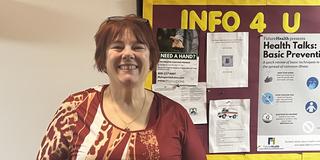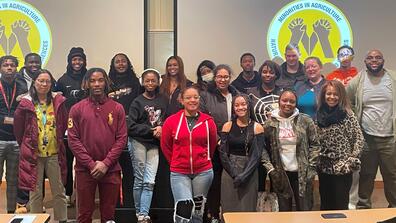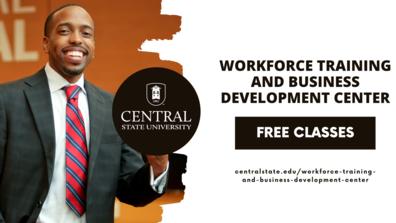The People of CSU: Connie Helmuth

Connie Helmuth is a family nurse practitioner (FNP) with a Master of Science in Nursing (MSN) who has been a longtime stalwart at Central State University’s Health Center. She was previously lauded as NP (Nurse Practitioner) Preceptor of the Year while working at another college, and in 2019, she earned the recognition of Public Nurse of the Year through the March of Dimes.
Learn more about Helmuth and her impactful, touching story of how and why she became the distinguished nurse she works every day to be while serving Central State.
Q: How did you originally end up working at Central State?
A: I had been applying for an NP position at a different school but needed what’s known as a “collaborating physician” and, after being recommended by a friend who knew her, had reached out to Dr. (Karen) Mathews (executive director, Health & Psychological Services at Central State’s Health & Wellness Center).
Every NP has to have a collaborating physician to bounce ideas off of or go to as needed. You can work independently and have your own business and things like that, but the state still wants you to have a medical doctor (MD) to collaborate with if you have a difficult case or something.
That was when I found out that Central State was hiring. And instead of Dr. Mathews being my collaborative physician for the other position, I ended up joining Central State instead!
Q: I understand you also have been interested in the past in being a missionary nurse? Is that something that still intrigues you?
A: I live nearby in Xenia and really like to be involved in my community, whether that means there or here at Central State. And I’ve realized that I don’t need to go to another country to do mission work; I can do it here right in my own backyard.
Q: What exactly do you mean by “mission work?”
A: The kind of nursing work where I can let people know that they’re cared about and thought about. That’s very important to what I do here at Central State, because we’re out in a remote area here. The students here don’t always have access to what we need. So, I like to be that bridge between what the students do need out here and what might be available for them in the surrounding community and just be a resource to students.
Q: What is it about doing this work at a college that so entices you?
A: I personally believe that education is empowerment. Education has completely changed my life. I love to teach, and we need to do everything we can to help these students get through their education at the school safely and healthily.
Q: What’s your day-to-day work as a nurse practitioner here at Central State?
A: For me, it really is a lot about educating students about how to stay healthy and safe with the choices they’re making. I can guide them if they’re having a tough time and need some extra help getting back on track. I write prescriptions if they’re sick, things like antibiotics. We wrap ankles here. We work on pains and strains here. We’re basically like a little urgent care here. We provide whatever treatment is needed.
Q: In addition to your work at Central State, you’re currently engaged in achieving your next level of education — Doctor of Nursing Practice (DNP) — with a thesis on addiction and depression in student well-being. Why is this such an important theme for you?
A: For me, the reason I’m so interested in addiction is that I had a son who struggled with it on and off for a very long time. Two years ago, he lost that fight and passed away after being clean for eight months. His drug of choice had been [the painkiller] Vicodin after having been in a motorcycle accident. He had been clean, his knee was hurting him, someone gave him a Vicodin, and he was gone within 20 minutes. It turned out it had three kinds of fentanyl in it.
For me, it’s important to let people, especially students, know that medications that you don’t know about or don’t know the origins of can be laced and are often laced with other things that can really hurt or even kill you. That unfortunately also includes marijuana. You can get something from the same person over and over again, and then just one time they give you something that might be laced with something else, and it can be deadly.
I want people to know that if you’re taking a drug that does not come from a doctor or pharmacy, you really need to think long and hard about that.
So, a lot of the work I do in my research for my doctorate is about engaging with these extremely important topics and how they can be applied to my work at Central State as a medical professional who is helping students but also can be working on prevention, too.
Q: What are some of the other ways that you’re involved with that Central State supports its students here?
A: We have NAMI (National Alliance of Mental Illness), which is a mental health group that the students lead. We’re one of the first student-run NAMI [on Campus] organizations [among HBCUs] in the country. Our office tries to do different kinds of socializing events, too, like music bingo and things like that. We’ll take a group or meet up with a group of students where we can and just have a fun, healthy night out, where they can meet up and enjoy themselves through games and activities we help run. Things like that.
I really like that, too, because then the community sees how respectful and polite our students can be. And the students never let us down; they’re so friendly and polite out in the community wherever we go for these events.
Q: Sounds like you have an opportunity to become close with a lot of the students who can use your counseling.
A: I do. I have a lot of students who come in here just to talk to me. There’s a lot more that goes on in here than just “medical.” A lot of people really need some counseling, and I do what I can to help or refer them to our Counseling Services as needed.
Q: Considering this difficult trauma you’ve experienced, you remain as ever passionate about your work here at Central State. From where does that inveterate passion come, would you say?
A: We definitely see some students who have come from tough places of their own, from rough family situations, and they’ve had a lot of people in the past who have just thrown their hands up and given up on them. We don’t do that here. We know that the person these students are at 18 is not going to be the person they’re going to be at 22 or 23. That’s why we have a sign up that reads, “We don’t want our Institution to be judged by the type of student it brings in but by the type of student it puts out.”
I personally believe that education is empowerment. — Connie Helmuth, Family Nurse Practitioner, Central State University


